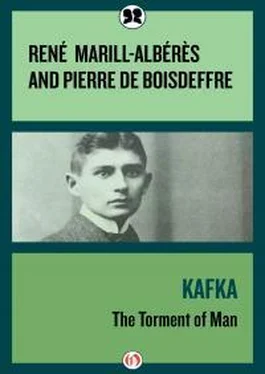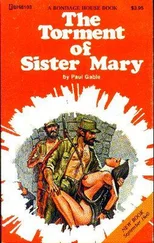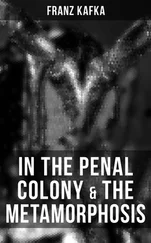Thereafter everything moved swiftly. Early in April he had to be taken to the sanatorium. But the results of the medical examinations were so bad that the Wiener Wald refused to assign him to a room: his larynx was already infected.
Transferred to the Vienna clinic of Professor Hajek, Kafka was unhappy: he received routine but impersonal treatment—he was treated as “the patient in room number so-and-so”—in spite of the interventions of Robert Klopstock and Franz Werfel. Finally he was taken to Kierling, near the Vienna Woods, where he had a room filled with flowers, and Dora to watch over him. But in May his lungs and his larynx were in such a state “that no specialist could help him any more, and the only thing one can do is to relieve pain by administering morphine or pantopon.” 5
Kafka could no longer talk and communicated in writing with those around him. He decided to ask for Dora’s hand, but he did so, as always, without daring to believe that his request would be granted. In a very humble letter he explained to Dora’s father that he was not a “true believer” but a penitent who would require much time to become worthy of Dora. As soon as he received this strange letter, the old man consulted one of his friends who was a rabbi—“the miracle-working rabbi”—and was dissuaded from accepting the patient for a son-in-law.
Kafka was dumbfounded. He had done his best to link himself to the human world, to seize the hand held out to him; it was not his fault that this hand was abandoning him at the most difficult stage. Today was not the beginning of his being tired of life. “This pitcher was already broken long before going for water.” “Nothing here is either my fault or the fault of men. I belong to profound silence; that is the climate which suits me.” 6
Henceforth everything fitted into the pattern of the last stage. The “final period” arrived—the period of “terrible moments,” “impossible to enumerate, almost uninterrupted.” “Walks, nights, days, incapable of everything except suffering.” 7Each evening an owl, the sign of death, appeared at the window of the dying man—whether in dream or in reality is of little consequence.
A brilliant month of May fell upon the sanatorium in which an ultrabrilliant mind continued to function inside a tattered body. “The only way of consoling oneself would be to say: that will happen, whether you wish it or not. And what you wish provides only imperceptible support. More than a consolation would be: you too have weapons.” 8There were the last dated lines, written a year earlier in his Diary . Kafka no longer entertained doubts: he was approaching an end which would be the beginning of everything. Before entering into the Holy of Holies he had to divest himself of his shoes, his luggage, all of his clothing; lay bare his nudity and “everything hidden under nudity”; abdicate his intelligence and everything that can rob us of “the inextinguishable fire” of conscience. Only this fire would be worthy of making contact with the Holy of Holies. Kafka wondered also what punishment awaited him. Doubtless the father’s contempt, the impossibility of marrying, the failure of his health had already sanctioned his original failure; but these were only the signs or premonitory symptoms of definitive punishment. Had Kafka been expelled from Paradise, had Paradise been destroyed, or—and this would be “the most terrible” punishment—would Paradise always remain inaccessible to him, “leaving the rest of things unchanged”?
On Monday, June 2, he wrote a long letter to his parents, trying to dissuade them from coming to Kierling. He was getting along better, though not well enough to receive them, for he would hardly be able to talk to them. “The truth is that the proprietor of the sanatorium is a sick old man who cannot be bothered with my case very much, and my relations with the very unwelcome assistant doctor are more on friendly than on medical terms.” Thus he took pains jokingly to reassure his family. But during the night he had difficulty in breathing, asked for morphine and, when the doctor hesitated, said to him, “Kill me, or you are a murderer!” A short time later he tore off his icepack and threw it on the floor (“Why torture me any more?”). When Dr. Klopstock, moving away from him for a moment, reassured him, “But I am not leaving you,” Kafka quickly retorted, “But I am leaving you.” A few moments later, he died.
Thus the dark, regal humor which had saved him so many times did not desert him in the presence of death. The “Kafkan” interjections inspired by this supreme moment recall Descartes’ famous admonition to a Swede named Diafoirus when the latter tried to bleed the dying philosopher: “Gentlemen, don’t waste French blood!”
All of his friends were deeply aware of their loss. Prostrate, Dora Dymant kept repeating his name for hours. Klopstock, who was later to become one of the leading lung specialists, contemplated this regal face “from the oldest and noblest stock” and wrote: “The gentleness of his human existence has gone; only his matchless spirit still shows through the rigid features of his face, which has the beauty of an ancient marble bust.” What had already been said of Proust some eighteen months earlier might well have been said of him: “This is not the end for Pascal.” His family buried him in the Jewish cemetery of Prague on a misty, dismal morning. There was a crowd around his parents, his sisters, and Dora Dymant, who collapsed on his grave. Did Dora then recall Kafka’s words, “The cruel part of death is that it brings the intense suffering associated with the end, but not the end”? 9
“I must confess that one day I envied someone very much,” he had written to Milena. “He was loved, well protected by strength and by reason, and laid to rest under flowers. I am always quick to envy.” This was now his fate. It was also to Milena that he had explained that a work begins to live only after the death of the author.
… living writers maintain a vital interest in their works. They fight for or against, solely because they are there. The true, independent life of a book begins only at their death, or more exactly, some time after their death. But then the book is alone and can rely solely on the strength of its own vitality. 10
When we read these lines, we are reminded of many writers who died before their works, like Kafka’s, actually took flight: Descartes, Pascal, Kierkegaard, Marcel Proust. There is an obvious parallelism between the life and experience of Proust and of Kafka: both were Jewish or half-Jewish, both were bachelors, both were obsessed by a creative project to which they sacrificed their lives, both were inclined to see underneath the appearances of reality something besides the ordinary world which satisfies the rest of us.
It was Proust who wrote these lines which might be from the pen of Kafka: “Happiness is salutary for the body but sorrow develops the strength of the mind … is indispensable in reminding us always of the truth and forcing us to take things seriously.… It is true that this truth, which is not compatible with happiness or health, is not always compatible with life.” 11But it was Kafka who wrote the following lines, which could be from the pen of Proust:
… One who is alive and does not succeed in life has need of a helping hand to mitigate somewhat the despair brought on him by his destiny—he is only partially successful in this respect—but on the other hand, he can write what he sees under the rubbish, for he sees more than others and sees things in a different light. Is he not dead even as he lives? Is he not the authentic survivor?
Three misfortunes produced in an indolent Marcel Proust the exclusive concentration on literary creation which a happy life would have denied him: his asthma isolated him, his parents died, and uranism finally locked him in a mental prison from which he emerged only to “revictual” his work. The paternal curse, the impossibility of marrying, and sickness played an identical role with Kafka. But the lonely hermit of Prague carried humility, renunciation, detachment further than the recluse of the Boulevard Haussmann. During his last days, of course, Proust—who was stripped of his “enjoyment of the universe,” deprived “of movement, of speech and of the simple comfort of not suffering,” “evicted as it were from himself,” and who no longer left his room but took refuge in his work, exclusively preoccupied with giving it “the unreservedness which was denied him”—bears a striking resemblance to Kafka. But “he still exhibited vanity, an awareness of social levels, and a passion for producing work which would be his revenge on life.” Nothing like this in Kafka. In the case of Proust, the man of letters killed the man; Kafka was a prophet, a vates in the old Latin sense, who was concerned neither with his own fate nor with the fate of his creations. For example, his friends had to force him to surrender his manuscripts for publication. In his will Kafka gave Max Brod the responsibility of destroying his unpublished manuscripts, and he himself burned more than one notebook.
Читать дальше












